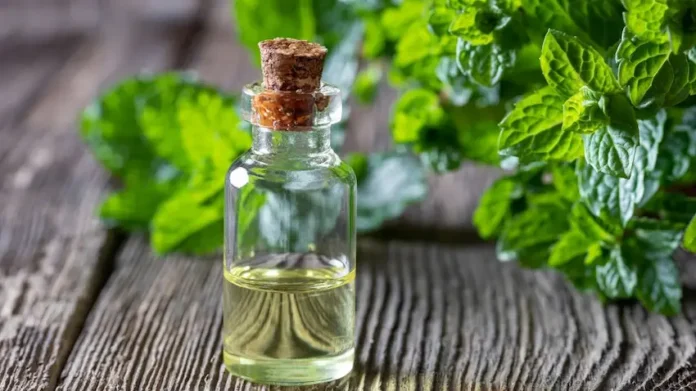Have you grown weary of contending with irksome pests both within and around your dwelling? Before reaching for chemical-laden insecticides or commercially produced repellents, consider peppermint oil for bugs, a natural and alternative solution.
Not only do insects detest mint, but it has also proven effective in warding off various pest species. With minimal effort and a few simple procedures, you can concoct your own mint-based formulas to maintain a home devoid of any bugs.
why do bugs hate peppermint
Peppermint exudes an aroma that most insects find unbearably irritating. In fact, the ladybug beetle emits a milky substance with a minty scent to deter predators. Peppermint is a potent natural repellant against cockroaches, caterpillars, fleas, flies, lice, mice, moths, and other pests.
Scientifically Validated
Research conducted at Auburn University in 2001 revealed peppermint oil as a powerful natural insect repellant. In a 14-day experiment, peppermint oil successfully repelled 100% of bugs. Studies demonstrated that, when applied to the skin, peppermint oil can provide complete protection from mosquitoes for up to 150 minutes.
How to use peppermint oil for bugs in the home
Should you be combating spiders, ants, mosquitoes, and other pests, try 100% pure peppermint oil. You can locate it at your local health food store or supermarket. Follow these straightforward steps to optimally exploit peppermint’s insect-repelling properties.
Place a few drops of pure peppermint essential oil onto a cotton ball and situate it where insects are frequently seen, like on windowsills or near doors. This should suffice, but if it doesn’t, create a spray.

How to make peppermint spray for bugs
Prepare a peppermint spray by combining 10 to 15 drops of essential oil with half a liter of warm water in a spray bottle. Use this mixture to mist tables, furniture, curtains, blinds, and hard-to-reach areas. Always test a small area first to ensure the oil does not damage the items you are spraying.
Furthermore, for outdoor use, you can apply this oil directly to your body. Apply the mixture onto your skin, but first test on a small patch of skin. For those with sensitive skin, it could be irritating.
Why Should We Avoid Conventional Insect Repellants?
Most commercially available insect repellants contain DEET (N,N-diethyl-meta-toluamide). A chemical linked to memory loss and other behavioral changes in rats after prolonged exposure. By choosing natural alternatives like mint. You can effectively repel insects without exposing yourself or your family to potentially harmful chemicals.
Mint Can Irritate Pets
Due to its strong aroma and natural pest-repelling properties. Peppermint oil has become a popular natural alternative to chemical pesticides for controlling indoor pests like spiders, fleas, flies, lice, and moths. However, if you have pets, it is crucial to consider potential safety concerns when using them.
Spraying peppermint oil around the house with caution
While peppermint oil is generally harmless for humans, it can pose risks to pets, especially cats and dogs. Cats are particularly sensitive to essential oils due to their unique liver metabolism, making them more susceptible to potential toxicity. Ingestion or prolonged exposure to peppermint oil can lead to unwanted reactions in cats such as vomiting, diarrhea, drooling, lethargy, and in extreme cases, trembling or seizures. Dogs, although less sensitive than cats. Can suffer similar symptoms if they consume or come into contact with large amounts of peppermint oil.
How Can I Use Peppermint Oil If I Have Pets?
- Dilute the Oil: Always dilute peppermint oil with an additional amount of water before using it as a pest repellent. Alternatively, during preparation, create a milder ratio of 10-15 drops of peppermint oil per liter of water. This approach will also aid in reducing the risk of undesirable effects on your pets.
- Use in Moderation: When using a diluted solution of peppermint oil, refrain from excessive spraying or treating areas where your pets frequently reside, sleep, or feed. Focus on specific zones where pests typically congregate, such as near doors, windows, or in corners.
- Store Safely: Keep peppermint oil and any mixtures containing it out of pets’ reach. Ensure containers are securely closed to prevent accidental ingestion or exposure.
- Monitor Your Pets: Closely observe your pets for any signs of adverse reactions after using peppermint oil. If you notice any unusual symptoms or behavior, cease use immediately and consult a veterinarian.
While peppermint oil can be an effective and natural solution for repelling indoor pests, it’s essential to prioritize your pets’ safety. By taking necessary precautionary measures, you can mitigate risks and maintain a home free from pests and potential dangers to your furry friends.
Questions asked by other readers
- How long does peppermint keep bugs away?
The efficacy of peppermint oil in warding off bugs can persist for a span of several hours, contingent upon the mode of application and insect type. - Does peppermint oil repel bed bugs?
Indeed, the nature of peppermint oil is such that it deters bed bugs, thereby establishing a serene and bug-free ambiance. - Does peppermint oil repel mosquitoes?
Unquestionably, peppermint oil functions as a natural repellant against mosquitoes, proffering a non-toxic resolution for these vexing intruders. - Do ants hate peppermint?
Ants, indeed, exhibit a significant aversion to peppermint, validating the oil’s efficacy as a deterrent. - How toxic is peppermint oil to cats?
If consumed or directly applied, peppermint oil can pose considerable toxicity to cats, potentially inducing adverse reactions such as vomiting, lethargy, or, in severe instances, tremors or seizures.
